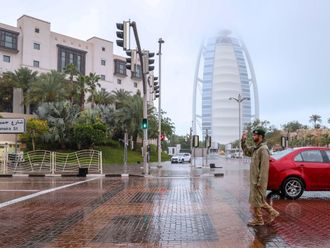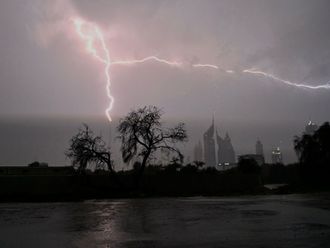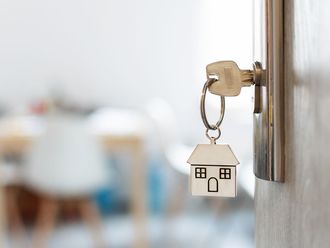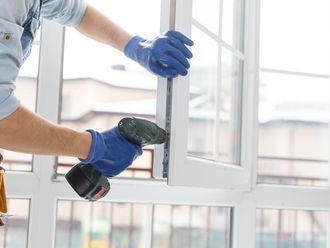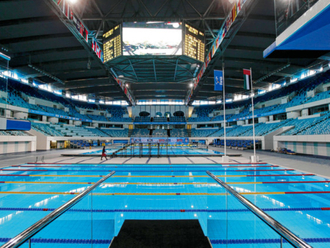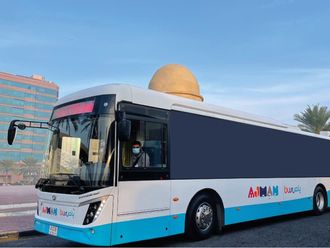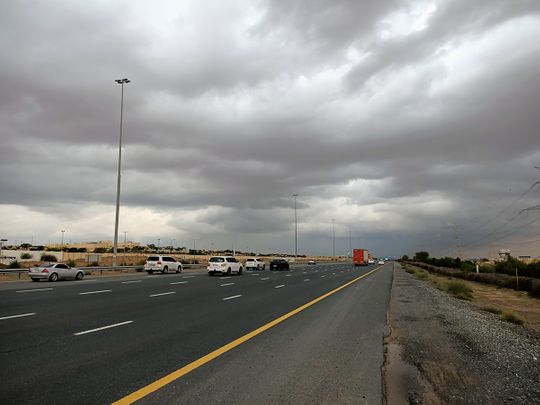
Dubai: UAE residents woke up to heavy rain, thunderstorms, and strong winds on Thursday morning, as predicted by the UAE's National Centre of Meteorology (NCM) on Wednesday, May 1. The extreme weather is expected to continue until Friday, May 3, and authorities have issued safety advisories for residents.
Here is a round-up of all the updates you need to keep in mind.
Will the weather be as severe as the rainstorm on April 16?
According to the latest weather alert by the National Centre of Meteorology (NCM) the upcoming weather conditions are milder than the previous extreme weather on April 16.
Unstable weather patterns with heavy rain and moderate hail is expected to start from Wednesday evening till Thursday afternoon.
On Friday and Saturday, the cloud cover over the country will decrease gradually, while some eastern and southern parts of the country, like Al Ain and Fujairah, will continue to receive light to moderate rainfall.
How do I get weather alerts?
NCM regularly publishes weather reports and forecasts on its official social media channels to inform residents and you can get the latest updates from the authority through the Gulf News weather reports here.
It is important to always refer to official announcements and information, especially during extreme weather conditions. On Wednesday, May 1, Umm Al Quwain Police warned that people should avoid sharing rumours and fake news because it creates panic, which is a punishable offence as per the UAE’s Cybercrime Law. The punishment for spreading rumours or publishing false news is one year in jail and a fine of Dh100,000.
Prepare for the weather changes with these essential tips
Dubai Health Authority (DHA) has shared the following tips, which can help you prepare for the expected weather changes.
• Risk assessment: Understand potential hazards and vulnerabilities in your area.
• Emergency planning: Create an emergency contacts list.
• Emergency supplies: Build a three-day emergency kit with water, medications, and food essentials.
• Home protection: Protect your home from rain damage with flood-resistant construction and maintenance. Secure doors/windows and prepare sandbags if needed.
• Staying informed and alert: Monitor weather conditions and forecasts. Avoid misinformation and rely on authorised sources
Emergency contact numbers
Dubai
• Dubai Police – for emergency only - 999 and for non-emergency - 901
• Civil Defence - 997
• Dubai Ambulance - 998
• Dubai Electricity and Water Authority (Dewa) - 991
• Dubai Municipality - 800900
• Dubai Roads and Transportation Authority (RTA) – 8009090
Abu Dhabi
• Abu Dhabi Police and Abu Dhabi Civil Defence Authority - 999
• Department of energy (AD and Al Ain Distribution companies) – electricity failure – 991 and water failure – 992
• Department of Municipalities and Transport (to report fallen trees and watersheds) – 993 or via WhatsApp – 02 6788888
Ajman
• Civil Defense 997
• Emergency situations - 999
• Non-emergency - 901
• Emergency search and rescue - 995
• Coast guard - 996
• National ambulance - 998
• Ajman contact centre - 80070
• Water malfunctions - 922
• Electricity malfunctions - 991
Distance learning for UAE schools announced
The UAE’s National Emergency Crisis and Disaster Management Authority (NCEMA) has announced that there will be remote learning on Thursday and Friday for all educational institutions.
“The decision is to be made by the concerned authorities at the federal level and the leaders of local emergency and disaster management teams each within their jurisdiction in Coordination with the Ministry of Education and the Emirates School Establishment according to the developments and impact of the situation,” stated NCEMA in an announcement today.
Currently remote learning has been announced for private schools in Dubai, Sharjah and Ajman.
Remote work for government and private sector
According to NCEMA’s announcement today, there will be remote work for all government institutions and the private sector on Thursday and Friday. Exceptions include essential roles, those necessitating physical presence, and positions involved in response and recovery efforts.
The Ministry of Human Resources and Emiratisation (MOHRE) has advised private sector companies to apply flexible and remote work patterns tomorrow, Thursday, May 2 to maintain the health and safety of their workers in light of the expected weather conditions.
“Vital jobs that require working at workplace premises and those of weather condition response teams are exempted from flexible and remote work,” MoHRE said in a statement.
MOHRE urged private sector companies and their employees to follow updates issued by authorites regarding the weather conditons and to comply with the instructions. The authority also called upon private sector to take caution and necessary occupational health and safety measures to maintain the safety of workers during weather fluctuations.
Areas you should avoid during heavy rain
In its advisory today, NCEMA stated that all roads leading to valleys, areas where water accumulates and dams must be closed during the unstable weather. The authority added that people must refrain from visiting mountains, deserts, and sea areas at this time to ensure their safety.
“Stay away from affected areas and comply with the directives of the specialised field teams,” NCEMA stated.
Dubai Metro timings extended
On Wednesday, May 1, RTA announced that to facilitate the transportation to and from Dubai International Airport, Dubai Metro hours will be extended on Wednesday, May 1 and Thursday, May 2 from 12am to 5am (next day).
Trains will depart from Centrepoint Metro Station and will only stop at the following stations:
• Emirates Metro Station
• Airport Terminal 1 Station
• Airport Terminal 3 Station
• GGICO Station
RTA advised commuters to ensure they have a minimum balance of Dh15 before starting their journey.
“Taxis will be available at Centrepoint and GGICO stations to easily transport you to your destinations after you disembark from the Metro,” RTA stated on X (formerly known as Twitter).
How do I reach Dubai International Airport (DXB)?
On X, Dubai International Airport (DXB) also alerted travellers on the upcoming rainy weather and advised them to follow these tips for a safe commute:
• Be sure to check your flight status with your airline.
• Allow for extra time to arrive at the airport.
• Use the Dubai Metro where possible – now open till 5am this Friday.
• Map your route using smart apps for real-time traffic updates.
Have flights been cancelled?
Flights operated by UAE carriers Emirates, Etihad Airways, flydubai, and Air Arabia were impacted by the adverse weather conditions, resulting in delays, cancellations, and diversions.
On Thursday, May 2, Emirates announced it has cancelled flights to several destinations including Istanbul, Nairobi, Cairo, Amman, Singapore and Johannesburg.
Is it safe to drive during unstable weather conditions?
Dubai Police urged drivers to exercise caution and prudence during the unstable weather conditions currently affecting the country.
They also urged drivers to take all precautionary measures, strictly adhere to traffic laws and regulations, reduce speed, maintain a sufficient, safe distance, avoid distractions, and not risk driving into valleys to photograph or chase rain due to its extreme danger.
Abu Dhabi Police called upon delivery bike riders to avoid riding in volatile weather conditions.
The police authority stressed the need to avoid riding motorcycles, especially when it rains, pointing out that the motorcycle is designed to travel on dry roads, and is therefore unsafe when driven in rain as it could lead to slipping and accidents.
For a more detailed guide on how to drive safely in the rain, read our guide here.
How do I protect my home from heavy rain?
According to a recent online post by Dubai Municipality, these are the tips and guidelines you should follow during rainy weather:
• Fasten outdoor furniture securely and clear light materials that can get swept away in windy conditions inside the house or building.
• Remove tools and equipment from balconies.
• Stay away from trees, unstable boards and construction sites.
• Report any emergency via 800900 or by sending a WhatsApp message on the same number.
• Secure electrical connections indoors.
• Clean internal rain gutters in the house or building.
• Use designated rainwater drains to drain accumulated rainwater.
• Avoid opening and using sewage drains to drain rain water.
To ensure continuous and secure electricity and water supply during the rain and extreme weather conditions, follow these safety tips from Dubai Electricity and Water Authority (Dewa):
• Check exposed connections and secure them by using water proof sockets and fixtures.
• Close all electric cabinets.
• Check all the connections are properly earthed.
• Seal all spare conduits, located at the building roof.
• Replace any damaged meter windows.
Dubai Media Office also shared the contact numbers of community management companies and real estate developers in Dubai for residents facing maintenance issues.
Safety precautions for residential buildings during rainy weather
According to Dubai Municipality, owners and operators of residential buildings in the emirate should take the preventive safety measures outlined below during the rainy season:
• Inspect rainwater drainage channels and manholes and take necessary maintenance measures to ensure that there are no obstructions causing blockages.
• Securely fix any objects that might be affected by strong winds (such as metal sheets, billboards, etc.) to prevent injuries.
• Ensure the isolation of all internal and external electrical connections.
• Securely close electrical panels and inspect all systems.
• Avoid touching electrical tools/equipment with wet hands.
• Remove debris from building rooftops to prevent rainwater pooling.
• Close all openings on the building's rooftops and ensure the ceilings are tightly sealed to prevent water leaking into the building's facilities.
• Securely cover water tanks, especially those located on ground floors and basement levels, to prevent rainwater from entering.
Al Ain municipality has also issued safety procedures at construction sites during the expected weather conditions:
• Stop all work on the sites.
• Secure cranes and scaffoldings and stop lifting operations.
• Install barriers, temporary fences and signs on construction sites.
• Remove potentially volatile materials from heights and open areas.


